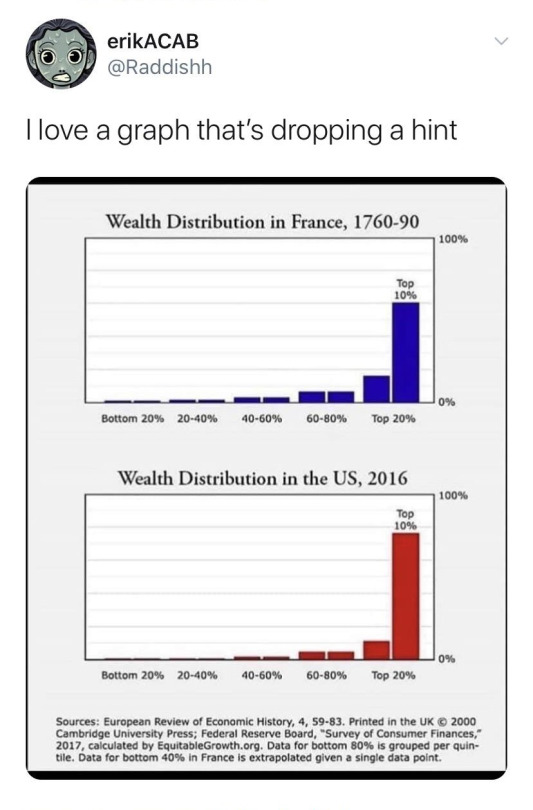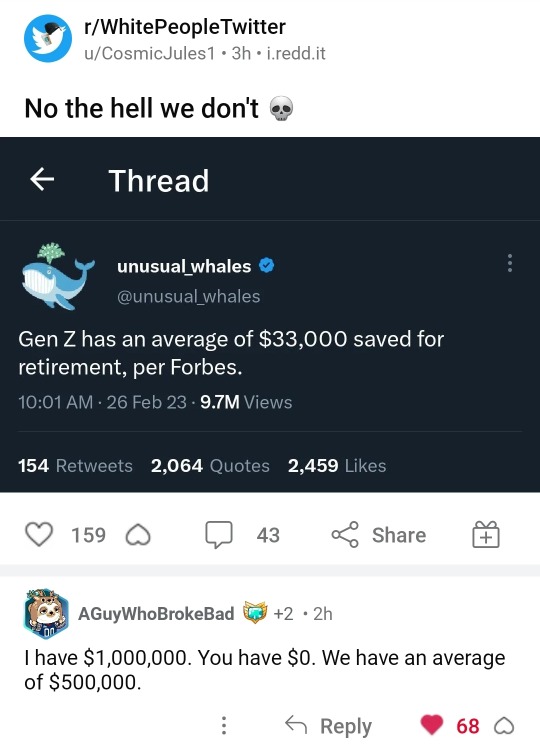#economism
Text
The impoverished imagination of neoliberal climate “solutions

This morning (Oct 31) at 10hPT, the Internet Archive is livestreaming my presentation on my recent book, The Internet Con.

There is only one planet in the known universe capable of sustaining human life, and it is rapidly becoming uninhabitable by humans. Clearly, this warrants bold action – but which bold action should we take?
After half a century of denial and disinformation, the business lobby has seemingly found climate religion and has joined the choir, but they have their own unique hymn: this crisis is so dire, they say, that we don't have the luxury of choosing between different ways of addressing the emergency. We have to do "all of the above" – every possible solution must be tried.
In his new book Dark PR, Grant Ennis explains that this "all of the above" strategy doesn't represent a change of heart by big business. Rather, it's part of the denial playbook that's been used to sell tobacco-cancer doubt and climate disinformation:
https://darajapress.com/publication/dark-pr-how-corporate-disinformation-harms-our-health-and-the-environment
The point of "all of the above" isn't muscular, immediate action – rather, it's a delaying tactic that creates space for "solutions" that won't work, but will generate profits. Think of how the tobacco industry used "all of the above" to sell "light" cigarettes, snuff, snus, and vaping – and delay tobacco bans, sin taxes, and business-euthanizing litigation. Today, the same playbook is used to sell EVs as an answer to the destructive legacy of the personal automobile – to the exclusion of mass transit, bikes, and 15-minute cities:
https://thewaroncars.org/2023/10/24/113-dark-pr-with-grant-ennis/
As the tobacco and car examples show, "all of the above" is never really all of the above. Pursuing "light" cigarettes to reduce cancer is incompatible with simply banning tobacco; giving everyone a personal EV is incompatible with remaking our cities for transit, cycling and walking.
When it comes to the climate emergency, "all of the above" means trying "market-based" solutions to the exclusion of directly regulating emissions, despite the poor performance of these "solutions."
The big one here is carbon offsets, which allows companies to make money by promising not to emit carbon that they would otherwise emit. The idea here is that creating a new asset class will unleash the incredible creativity of markets by harnessing the greed of elite sociopaths to the project of decarbonization, rather of the prudence of democratically accountable lawmakers.
Carbon offsets have not worked: they have been plagued by absolutely foreseeable problems that have not lessened, despite repeated attempts to mitigate them.
For starters, carbon offsets are a classic market for lemons. The cheapest way to make a carbon offset is to promise not to emit carbon you were never going to emit anyway, as when fake charities like the Nature Conservancy make millions by promising not to log forests that can't be logged because they are wildlife preserves:
https://pluralistic.net/2022/03/18/greshams-carbon-law/#papal-indulgences
Then there's the problem of monitoring carbon offsetting activity. Like, what happens when the forest you promise not to log burns down? If you're a carbon trader, the answer is "nothing." That burned-down forest can still be sold as if it were sequestering carbon, rather than venting it to the atmosphere in an out-of-control blaze:
https://pluralistic.net/2021/07/26/aggregate-demand/#murder-offsets
When you bought a plane ticket and ticked the "offset the carbon on my flight" box and paid an extra $10, I bet you thought that you were contributing to a market that incentivized a reduction in discretionary, socially useless carbon-intensive activity. But without those carbon offsets, SUVs would have all but disappeared from American roads. Carbon offsets for Tesla cars generated billions in carbon offsets for Elon Musk, and allowed SUVs to escape regulations that would otherwise have seen them pulled from the market:
https://pluralistic.net/2021/11/24/no-puedo-pagar-no-pagara/#Rat
What's more, Tesla figured out how to get double the offsets they were entitled to by pretending that they had a working battery-swap technology. This directly translated to even more SUVs on the road:
https://en.wikipedia.org/wiki/Criticism_of_Tesla,_Inc.#Misuse_of_government_subsidies
Harnessing the profit motive to the planet's survivability might sound like a good idea, but it assumes that corporations can self-regulate their way to a better climate future. They cannot. Think of how Canada's logging industry was allowed to clearcut old-growth forests and replace them with "pines in lines" – evenly spaced, highly flammable, commercially useful tree-farms that now turn into raging forest fires every year:
https://pluralistic.net/2023/09/16/murder-offsets/#pulped-and-papered
The idea of "market-based" climate solutions is that certain harmful conduct should be disincentivized through taxes, rather than banned. This makes carbon offsets into a kind of modern Papal indulgence, which let you continue to sin, for a price. As the outstanding short video Murder Offsets so ably demonstrates, this is an inadequate, unserious and immoral response to the urgency of the issue:
https://pluralistic.net/2021/04/14/for-sale-green-indulgences/#killer-analogy
Offsets and other market-based climate measures aren't "all of the above" – they exclude other measures that have better track-records and lower costs, because those measures cut against the interests of the business lobby. Writing for the Law and Political Economy Project, Yale Law's Douglas Kysar gives some pointed examples:
https://lpeproject.org/blog/climate-change-and-the-neoliberal-imagination/
For example: carbon offsets rely on a notion called "contrafactual carbon," this being the imaginary carbon that might be omitted by a company if it wasn't participating in offsets. The number of credits a company gets is determined by the difference between its contrafactual emissions and its actual emissions.
But the "contrafactual" here comes from a business-as-usual world, one where the only limit on carbon emissions comes from corporate executives' voluntary actions – and not from regulation, direct action, or other limits on corporate conduct.
Kysar asks us to imagine a contrafactual that depends on "carbon upsets," rather than offsets – one where the limits on carbon come from "lawsuits, referenda, protests, boycotts, civil disobedience":
https://www.theguardian.com/commentisfree/cif-green/2010/aug/29/carbon-upsets-offsets-cap-and-trade
If we're really committed to "all of the above" as baseline for calculating offsets, why not imagine a carbon world grounded in foreseeable, evidence-based reality, like the situation in Louisiana, where a planned petrochemical plant was canceled after a lawsuit over its 13.6m tons of annual carbon emissions?
https://earthjustice.org/press/2022/louisiana-court-vacates-air-permits-for-formosas-massive-petrochemical-complex-in-cancer-alley
Rather than a tradeable market in carbon offsets, we could harness the market to reward upsets. If your group wins a lawsuit that prevents 13.6m tons of carbon emissions every year, it will get 13.6 million credits for every year that plant would have run. That would certainly drive the commercial imaginations of many otherwise disinterested parties to find carbon-reduction measures. If we're going to revive dubious medieval practices like indulgences, why not champerty, too?
https://en.wikipedia.org/wiki/Champerty_and_maintenance
That is, if every path to a survivable planet must run through Goldman-Sachs, why not turn their devious minds to figuring out ways to make billions in tradeable credits by suing the pants off oil companies?
There are any number of measures that rise to the flimsy standards of evidence in support of offsets. Like, we're giving away $85/ton in free public money for carbon capture technologies, despite the lack of any credible path to these making a serious dent in the climate situation:
https://www.spglobal.com/commodityinsights/en/market-insights/latest-news/energy-transition/072523-ira-turbocharged-carbon-capture-tax-credit-but-challenges-persist-experts
If we're willing to fund untested longshots like carbon capture, why not measures that have far better track-records? For example, there's a pretty solid correlation between the presence of women in legislatures and on corporate boards and overall reductions in carbon. I'm the last person to suggest that the problems of capitalism can be replaced by replacing half of the old white men who run the world with women, PoCs and queers – but if we're willing to hand billions to ferkakte scheme like carbon capture, why not subsidize companies that pack their boards with women, or provide campaign subsidies to women running for office? It's quite a longshot (putting Liz Truss or Marjorie Taylor-Greene on your board or in your legislature is no way to save the planet), but it's got a better evidentiary basis than carbon capture.
There's also good evidence that correlates inequality with carbon emissions, though the causal relationship is unclear. Maybe inequality lets the wealthy control policy outcomes and tilt them towards permitting high-emission/high-profit activities. Maybe inequality reduces the social cohesion needed to make decarbonization work. Maybe inequality makes it harder for green tech to find customers. Maybe inequality leads to rich people chasing status-enhancing goods (think: private jet rides) that are extremely carbon-intensive.
Whatever the reason, there's a pretty good case that radical wealth redistribution would speed up decarbonization – any "all of the above" strategy should certainly consider this one.
Kysar's written a paper on this, entitled "Ways Not to Think About Climate Change":
https://political-theory.org/resources/Documents/Kysar.Ways%20Not%20to%20Think%20About%20Climate%20Change.pdf
It's been accepted for the upcoming American Society for Political and Legal Philosophy conference on climate change:
https://political-theory.org/13257256
It's quite a bracing read! The next time someone tells you we should hand Elon Musk billions to in exchange for making it possible to legally manufacture vast fleets of SUVs because we need to try "all of the above," send them a copy of this paper.

If you'd like an essay-formatted version of this post to read or share, here's a link to it on pluralistic.net, my surveillance-free, ad-free, tracker-free blog:
https://pluralistic.net/2023/10/31/carbon-upsets/#big-tradeoff
#pluralistic#neoliberalism#climate#market worship#economics#economism#there is no alternative#carbon credits#climate emergency#contrafactual carbon#carbon upsets#apologetics#murder offsets#indulgences
228 notes
·
View notes
Text
Economists have the least tasty brains. Too myopic. Like eating a sandwich that tastes overwhelmingly of white bread. I experienced that through the memories of an economist.
10 notes
·
View notes
Text
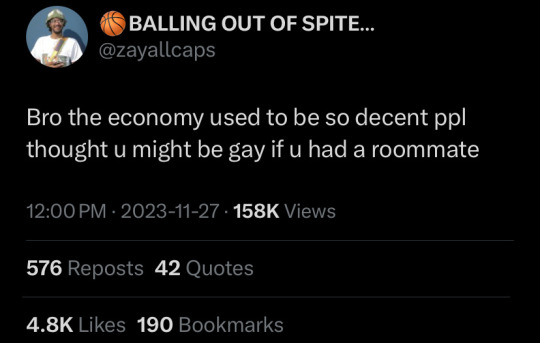
#lgbt#lgbtq#lgbtqia#economics#economy#capitalism#politics#twitter#tweets#tweet#meme#memes#funny#lol#humor
72K notes
·
View notes
Text




The French really don’t fuck around.
#France#emmanuel macron#capitalism#socialism#america#usa#democrats#republicans#gop#twitter#economics#fox news#pensions#macron
204K notes
·
View notes
Text
I feel like a good shorthand for a lot of economics arguments is "if you want people to work minimum wage jobs in your city, you need to allow minimum wage apartments for them to live in."
"These jobs are just for teenagers on the weekends." Okay, so you'll use minimum wage services only on the weekends and after school. No McDonald's or Starbucks on your lunch break.
"They can get a roommate." For a one bedroom? A roommate for a one bedroom? Or a studio? Do you have a roommate to get a middle-wage apartment for your middle-wage job? No? Why should they?
"They can live farther from city center and just commute." Are there ways for them to commute that don't equate to that rent? Living in an outer borough might work in NYC, where public transport is a flat rate, but a city in Texas requires a car. Does the money saved in rent equal the money spent on the car loan, the insurance, the gas? Remember, if you want people to take the bus or a bike, the bus needs to be reliable and the bike lanes survivable.
If you want minimum wage workers to be around for you to rely on, then those minimum wage workers need a place to stay.
You either raise the minimum wage, or you drop the rent. There's only so long you can keep rents high and wages low before your workforce leaves for cheaper pastures.
"Nobody wants to work anymore" doesn't hold water if the reason nobody applies is because the commute is impossible at the wage you provide.
88K notes
·
View notes
Text
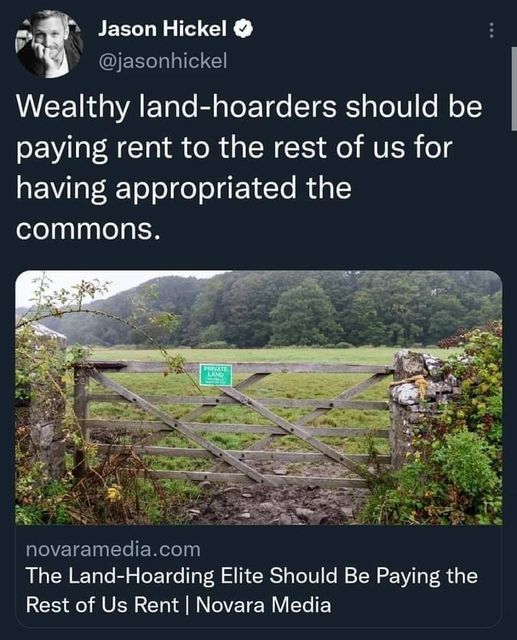
18K notes
·
View notes
Text
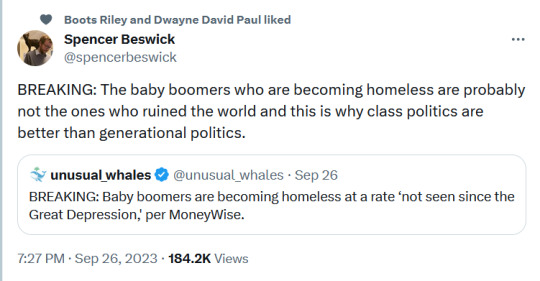
#twitter#tweet#tweets#boomers#economics#economy#homeless#class politics#generational politics#class#inequality#wealth inequality
42K notes
·
View notes
Photo
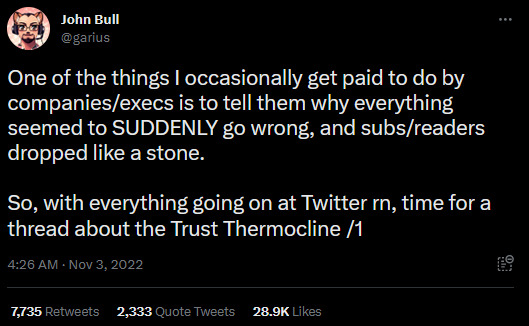

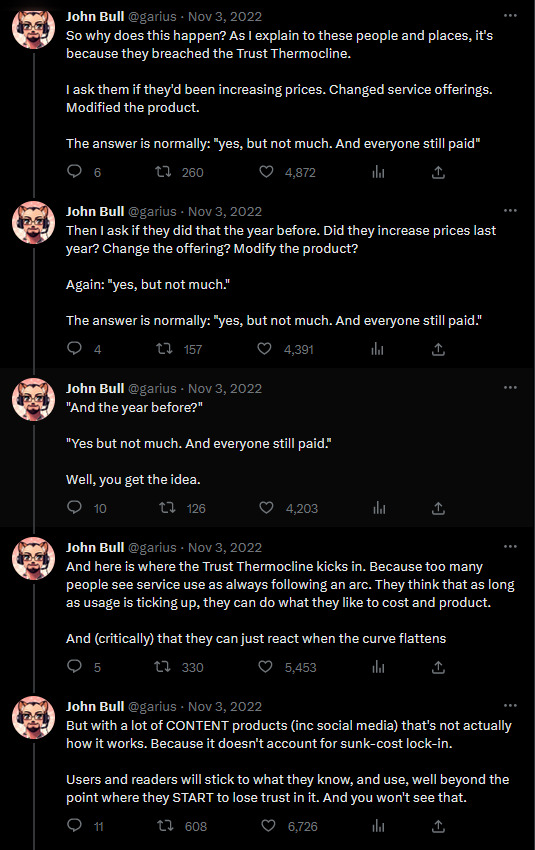
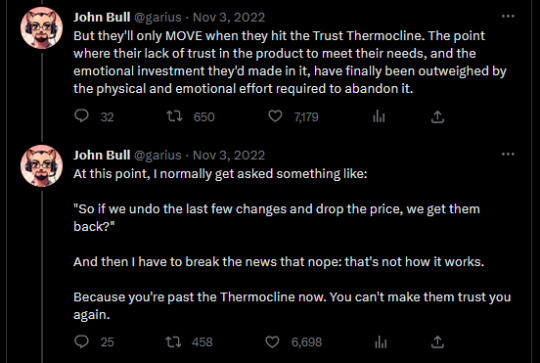
Really good Twitter thread originally about Elon Musk and Twitter, but also applies to Netflix and a lot of other corporations.
Full thread. Text transcription under cut.
John Bull @garius
One of the things I occasionally get paid to do by companies/execs is to tell them why everything seemed to SUDDENLY go wrong, and subs/readers dropped like a stone. So, with everything going on at Twitter rn, time for a thread about the Trust Thermocline /1
So: what's a thermocline?
Well large bodies of water are made of layers of differing temperatures. Like a layer cake. The top bit is where all the the waves happen and has a gradually decreasing temperature. Then SUDDENLY there's a point where it gets super-cold.
That suddenly is important. There's reasons for it (Science!) but it's just a good metaphor. Indeed you may also be interested in the "Thermocline of Truth" which a project management term for how things on a RAG board all suddenly go from amber to red.
But I digress.
The Trust Thermocline is something that, over (many) years of digital, I have seen both digital and regular content publishers hit time and time again. Despite warnings (at least when I've worked there). And it has a similar effect. You have lots of users then suddenly... nope.
And this does effect print publications as much as trendy digital media companies. They'll be flying along making loads of money, with lots of users/readers, rolling out new products that get bought. Or events. Or Sub-brands.
And then SUDDENLY those people just abandon them.
Often it's not even to "new" competitor products, but stuff they thought were already not a threat. Nor is there lots of obvious dissatisfaction reported from sales and marketing (other than general grumbling). Nor is it a general drift away, it's just a sudden big slide.
So why does this happen? As I explain to these people and places, it's because they breached the Trust Thermocline.
I ask them if they'd been increasing prices. Changed service offerings. Modified the product.
The answer is normally: "yes, but not much. And everyone still paid"
Then I ask if they did that the year before. Did they increase prices last year? Change the offering? Modify the product?
Again: "yes, but not much."
The answer is normally: "yes, but not much. And everyone still paid."
"And the year before?"
"Yes but not much. And everyone still paid."
Well, you get the idea.
And here is where the Trust Thermocline kicks in. Because too many people see service use as always following an arc. They think that as long as usage is ticking up, they can do what they like to cost and product.
And (critically) that they can just react when the curve flattens
But with a lot of CONTENT products (inc social media) that's not actually how it works. Because it doesn't account for sunk-cost lock-in.
Users and readers will stick to what they know, and use, well beyond the point where they START to lose trust in it. And you won't see that.
But they'll only MOVE when they hit the Trust Thermocline. The point where their lack of trust in the product to meet their needs, and the emotional investment they'd made in it, have finally been outweighed by the physical and emotional effort required to abandon it.
At this point, I normally get asked something like:
"So if we undo the last few changes and drop the price, we get them back?"
And then I have to break the news that nope: that's not how it works.
Because you're past the Thermocline now. You can't make them trust you again.
56K notes
·
View notes
Text
Every single craft has been paying “The Passion Tax” for generations. This term (coined by author and organizational psychologist Adam Grant) — and backed by scientific research — simply states that the more someone is passionate about their work, the more acceptable it is to take advantage of them. In short, loving what we do makes us easy to exploit.
Guest Column: If Writers Lose the Standoff With Studios, It Hurts All Filmmakers
#quotes#writing#economics#capitalism#the passion tax#adam grant#writers#wga#wga strong#writers strike
26K notes
·
View notes
Text
Things I've learned from getting covid for the first time in 2023
I wear an N95 in public spaces and I've managed to dodge it for a long time, but I finally got covid for the first time (to my knowledge) in mid-late November 2023. It was a weird experience especially because I feel like it used to be something everyone was talking about and sharing info on, so getting it for the first time now (when people generally seem averse to talking about covid) I found I needed to seek out a lot of info because I wasn't sure what to do. I put so much effort into prevention, I knew less about what to do when you have it. I'm experiencing a rebound right now so I'm currently isolating.
So, I'm making a post in the hopes that if you get covid (it's pretty goddamn hard to avoid right now) this info will be helpful for you. It's a couple things I already knew and several things I learned. One part of it is based on my experience in Minnesota but some other states may have similar programs.
--------
The World Health Organization states you should isolate for 10 days from first having symptoms plus 3 days after the end of symptoms.
--------
At the time of my writing this post, in Minnesota, we have a test to treat program where you can call, report the result of your rapid test (no photo necessary) and be prescribed paxlovid over the phone to pick up from your pharmacy or have delivered to you. It is free and you do not need to have insurance. I found it by googling "Minnesota Test to Treat Covid"
--------
Paxlovid decreases the risk of hospitalization and death, but it's also been shown to decrease the risk of Long Covid. Long Covid can occur even from mild or asymptomatic infections.
--------
Covid rebound commonly occurs 2-8 days after apparent recovery. While many people associate Paxlovid with covid rebound, researchers say there is no strong evidence that Paxlovid causes covid rebound, and rebounds occur in infections that were not treated with Paxlovid as well. I knew rebounds could happen but did not know it could take 8 days. I had mine on day 7 and was completely surprised by it.
--------
If you start experiencing new symptoms or test positive again, the CDC states that you should start your isolation period again at day zero. Covid rebound is still contagious. Personally I'd suggest wearing a high quality respirator around folks for an additional 8-9 days after you start to test negative in case of a rebound.
--------
Positive results on a rapid test can be very faint, but even a very faint line is positive result. Make sure to look at your rapid test result under strong lighting. Also, false negatives are not uncommon. If you have symptoms but test negative taking multiple tests and trying different brands if you have them are not bad ideas. My ihealth tests picked up my covid, my binax now tests did not.
--------
EDIT: I'd highly suggest spending time with friends online if you can, I previously had a link to the NAMI warmline directory in this post but I've since been informed that NAMI is very much funded by pharmaceutical companies and lobbies for policies that take autonomy away from disabled folks, so I've taken that off of here! Sorry, I had no idea, the People's CDC listed them as a resource so I just assumed they were legit! Feel free to reply/reblog this with other warmlines/support resources if you know of them! And please reblog this version!
--------
I know that there is so much we can't control as individuals right now, and that's frightening. All we can do is try our best to reduce harm and to care for each other. I hope this info will be able to help folks.
#covid#covid 19#harm reduction#apparently only 16% of Americans even got their booster#it's wild out there#which makes sense because our public health messaging has been super unhelpful and intentionally shifted the burden#of infection control onto individuals to avoid us holding them accountable because it's politically and economically inconvenient to them
9K notes
·
View notes
Text
i think a lot about exactly 1 thing from the roman empire: the concept of bread and circus. the idea was that if your population was fed and entertained, they wouldn't revolt. you are asking us to give up our one small life, is the thing - for under 15 dollars an hour.
what would that buy, even. i am trading weekends and late nights and my back health. i am trading slow mornings and long walks and cortisol levels. i am trading sleep and silence and peace. for ... this. for what barely-covers-rent.
life really is more expensive right now. you aren't making that up. i make almost 3 times what i did 5 years ago, and despite an incredibly equal series of bills - i am still struggling. the most expensive line item i added was to own a dog. the money is just evaporating.
we were okay with it because it's a cost-benefit analysis. i could handle the customer harassment and standing all day and the manager's constantly changing temperament - i was coming home to hope, and my life planned in a blue envelope. three hours would buy me my dog's food for a month. i can give up three hours for him, for his shiny coat and wide, happy mouth. three days could be a new mattress, if i was thrifty. if i really scrimped and saved, we could maybe afford a trip into the city.
recently i cried in the car about the price of groceries.
business majors will be mad at me, but my most inflammatory opinion is that people should never be valued at the same place as products. your staff should not be a series of numbers in an excel sheet that you can just "replace" whenever you need something at that moment. your staff should be people, end of sentence.
it feels like someone somewhere is playing a very bad video game. like my life is a toy. like someone opened an app on their phone and hired me in diner dash ultra. they don't need to pay me well or treat me alright - they can always just show me the door. there is always someone more desperate, always someone more willing.
but i go to work and know i could save for years and not afford housing. i am never going to own my own home, most likely. i have no idea how to afford her ring, much less the wedding. my dog doesn't have his own yard. everything i love is on subscription. if i lose my job, i have no "nest egg" to catch my falling.
this thin life - they want me to give up summer for it. to open my mouth and throat and swallow the horrible hours and counted keystrokes. they want me to give up mountains and any non-federal holiday. to give up snow days. to give up talking to my mom whenever i want. to give up visiting the ocean and hearing the waves.
bread and circus worked for a while, actually. it was the kind of plan that would probably now be denounced by republicans as socialist commie liberal pronoun bullshit.
but sometimes i wonder if we should point them to the part of the history book that says: it worked until it didn't.
#spilled ink#warm up#writeblr#i have a good job please shut the fuck up before telling me to get a better job#girl i have vision and dental.#if u blame the victim that's wild. do u know about economic systems
9K notes
·
View notes
Text

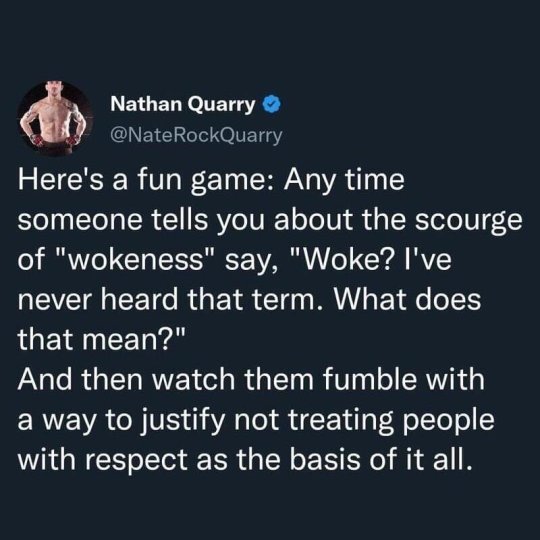
82K notes
·
View notes
Text

#funny#lol#haha#humor#meme#memes#tweet#twitter#adulthood#facts#politics#us politics#economics#economy
5K notes
·
View notes
Text
I love when newspapers are like "why are people so pessimistic about the economy when stocks are up and inflation is slowing?" Maybe because stocks mean next to nothing to the average person? Maybe because inflation slowing down still leaves it astronomically high when wages haven't kept up pace? Maybe because rents and housing in general have increased far beyond normal inflation and people are only left with the choice to pay up or be homeless? Maybe because most people's lives are still a complete hellscape in the real world regardless of the theoretical numbers on your little spreadsheet????
10K notes
·
View notes
